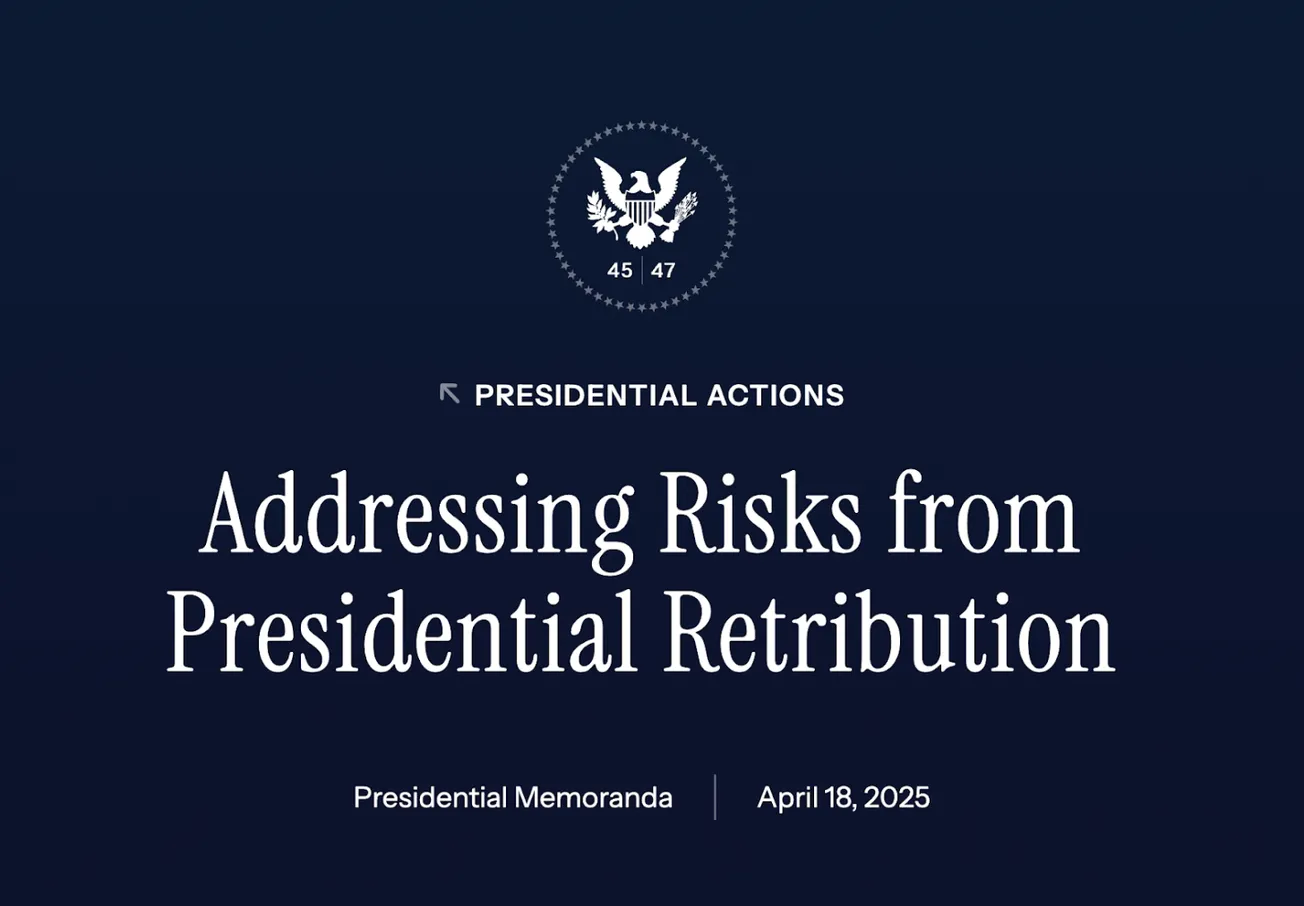Table of Contents
On April 9th, the White House published a pair of presidential memoranda, cannibalizing officials from President Trump’s first administration. Those targeted include Director of the Cybersecurity and Infrastructure Security Agency Chris Krebs and former DHS Chief of Staff Miles Taylor. The orders, entitled “Addressing Risks from Chris Krebs and Government Censorship” and “Addressing Risks Associated with an Egregious Leaker and Disseminator of Falsehoods,” instruct government officials to strip Krebs, Taylor, and “individuals at entities associated,” such as the University of Pennsylvania, of federal security clearance and directs DOJ and other executive agencies to investigate their activities.
Together, these orders pose perhaps the most noxious challenge from this administration to norms of free speech, public service, and the civic values that define what it means to be American. Mobilizing the full weight of some of the most powerful executive agencies down on specific individuals through an official presidential order is an extraordinary move that requires strong justifications.
The White House’s stated purposes? Taylor “manufactur[ed] sensationalist reports on the existence of a supposed ‘resistance’ within the Federal Government” and “illegally published classified conversations to sell his book under the pseudonym ‘Anonymous.’” Krebs’s great crime was that he “suppressed conservative viewpoints….covertly worked to blind the American public to the controversy surrounding Hunter Biden’s laptop…promoted the censorship of election information, including known risks associated with certain voting practices” and, worst of all “falsely and baselessly denied that the 2020 election was rigged and stolen.”
The motive here seems plain, especially in the Krebs case. Taylor is at least alleged to have leaked classified documentation, a dubious assertion to be determined through an investigatory and legal process. Krebs, even more blatantly, is being investigated for publically refusing to claim that the 2020 election was stolen, and therefore upholding his constitutional duty as a public servant. Repeating this lie has become a political litmus test for Trump's officials and allies during his second administration, as part of a campaign of retribution against those who they believe to have wronged or otherwise embarrassed them. Both Krebs and Taylor were noted as having personally infuriated President Trump during his first term, acting as the so-called establishment “adults in the room” who were largely excluded from the executive branch this time around. Indeed, as he signed the orders directing his subordinates to investigate them, the president levied personal attacks on both men, saying Taylor was “like a traitor” for spreading lies about the administration on CNN and Krebs was a “fraud” and a “disgrace.”
Of course, President Trump isn’t the first leader to direct his subordinates toward personal retribution through public power. From Roman proscriptions to the denunciations of Stalin’s Great Terror, leaders have long sought to make their vendettas the concern of the state. Of course, these executive orders come nowhere close to such political violence. However, a historical analog exists in President Nixon’s infamous enemies list, which was expressly created to “use the available federal machinery to screw our political enemies.”
In the United States, we have long believed that the weaponization of government power against individual political opponents is wrong. Indeed, this concern was explicitly envisioned by the Founding Fathers: Article I, Section 9, Clause 3 of the Constitution stipulates that “No Bill of attainder or Ex post facto law shall be passed,” a direct rebuke of the English tradition of legislative bills declaring the retroactive guilt of an individual. An executive bill of attainder, as the judge in the case of law firm Perkins Coie, another of President Trump’s targets, claims the administration is executing, is no longer valid. And neither should executive agencies be wasting time, resources, and reputation in investigations for personally and politically motivated purposes. The presentation of these directives as presidential memoranda rather than executive orders, with scant legal justification, underscores this point.
Perhaps the most objectionable component of these orders is this line from the one targeting Chris Krebs: “The Federal Government has a constitutional duty and a moral responsibility to respect and promote the free speech rights of Americans.” The administration is absolutely, 100% right about this, but ironically these orders directly contradict those principles—they threaten insiders who have become dissenters in public discourse, all because the administration opposes their views.
The president’s public claim, as he signed an order for the DOJ to investigate Taylor, that he was “like a traitor” for spreading lies about his administration on the news is deeply troubling. Such a use of executive power threatens to have a chilling effect on free speech, creates rampant potential for abuse in the future, and threatens to monopolize thought inside the conservative movement. Conservatives, more than anyone, should be vigilant against the creeping personalization of power at the expense of individual liberty. Indeed, President Trump and his allies have repeatedly, and often validly, stressed how the Department of Justice and the federal government were “weaponized” against them under President Biden. Yet they now seek to do the same. If they truly believe in free speech, the administration must repeal these memoranda and end their investigations—this pair of orders are anathema to how executive power ought to be exercised, anathema to the ideas behind the conservative movement, and anathema to everything that America stands for.





